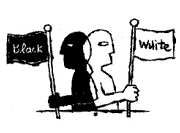Since World War II, nation-states, rebel groups, and terrorists alike have routinely killed large numbers of innocent civilians as a way of achieving their political goals. It’s been the way of the world, and few Americans have cared—until September 11. Suddenly, most of the world cared very much, because all of us could imagine ourselves dying in those towers in New York. “There but for the grace of [deity] . . . ” is an extremely powerful emotion.
For African Americans in Seattle, that emotion is at the core of the Aaron Roberts case. Many of the questions about the shooting itself, laid out in the accompanying article, haven’t been widely noted in local media—but Central District residents asked them within hours of Roberts’ shooting. Simply put, many people didn’t trust SPD’s shifting stories, both because they were inconsistent with physics and human nature and because many already distrusted SPD in the first place. They didn’t trust SPD because, for decades, SPD’s relationship with African Americans has been strained by shootings, racial profiling, discriminatory enforcement, and the hostile “enemy” attitude of some officers. Many people in the CD felt that they could have easily been Aaron Roberts. Or David Walker. Or Michael Ealy. Or Edwin Anderson. Or any of the other black people, frequently unarmed, who have died at local law enforcement’s hands over the past four decades.
The Aaron Roberts shooting itself, however, was not what ripped away the thin veneer of civility covering the raw wound of Seattle’s race relations; that happened when the rest of the city responded to CD protests of the Roberts shooting. Only three months earlier, many people had viewed the youth-and alcohol-fueled riots of Mardi Gras as racially motivated attacks on whites. When African Americans also claimed the mantle of victimhood, civic Seattle had a choice: Blacks and whites could unite, recognizing that violence is never acceptable, no matter who commits it and no matter what the motivation. Or, they could trade accusations and posturing, each group claiming greater victimization and accusing the other of being the perpetrator of violence. Far too many people, black and white alike, chose the latter course, and Seattle’s liberal pretense of racial harmony shattered. And there it has lain, as civic Seattle responded to the chasm in race relations in a time-tested way: For the last four months, we have ignored it, hoping it will go away.
But it won’t, and next Monday, Aaron Roberts’ inquest will begin. It is a potentially explosive situation: For decades, no Seattle police officer who has taken a life has been found criminally liable. Seattle’s police and many of its citizens, exposed only to SPD’s version of what happened the night of May 30, fully expect another such verdict. But a lot of people following the case—especially African Americans who link it to their own experiences of being pulled over for no apparent reason—will be livid, given the facts of the case, if SPD and its officer get off with “a free paid vacation for shooting another unarmed black man.” And Seattle has done very, very little to bridge the divide between those two perceptions.
If any good can come out of Aaron Roberts’ death, it is that finally, at least for the moment, people are talking about race in Seattle—and many are even talking about it with their friends or co-workers of different races. Nonwhites frequently don’t feel heard in civic Seattle. In 1999’s city elections, three seats were contested. In each, a white person ran against a nonwhite. In each, despite their enormous political differences, the nonwhite (Charlie Chong, Cheryl Chow, and Dawn Mason) carried the 37th District, the racially diverse south end. And in each, the rest of the city voted for, and voted in, their politically mixed white opponents: Heidi Wills, Judy Nicastro, and Jim Compton. Even more striking, that dynamic was ignored by Seattle’s largely white local media. We take this sort of thing for granted; nonwhites don’t—and they often haven’t felt included in discussions and decisions that affect policies with racial implications.
Between the inquest concerning Aaron Roberts’ death, and the mayoral candidacy (backed by both daily papers) of Mark Sidran, a man many see as deriving much of his political support from racially divisive policies, this is a raw moment for race relations in Seattle. The people who are most raw—black, white, or other—are mostly not people Seattle’s civic leaders talk with or hear from. They’re the folks who fire off vicious, hate-filled e-mails or make racially offensive comments in loud voices from the back of the bus. Those are the folks that need to sit down and talk, and soon. There are people in Seattle who felt they were unsafe—whether from white cops or black street thugs—long before the World Trade Center towers collapsed. Unless Seattle deals with their safety, and soon, the war will begin at home.







